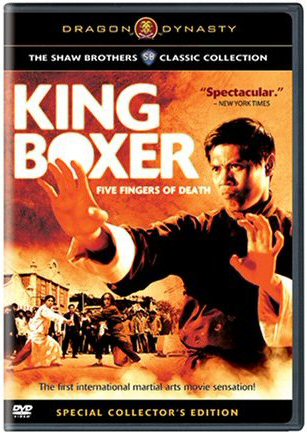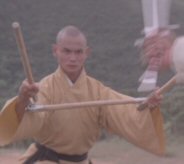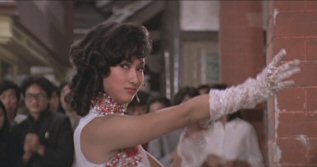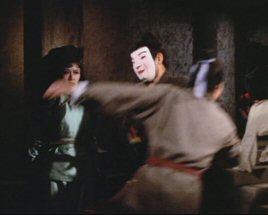Just in time for school to be out, Dragon Dynasty releases a set of DVDs to further your education. At least, it's education in film history, with four films that you may not realize have had a huge influence on American pop culture.
And that's not just because Quentin Tarantino provides commentary on King Boxer, also known as Five Fingers of Death. Look at enough films in the Dragon Dynasty collection and you may be able to edit together your own Tarantino film. Certainly you'll notice the connection in King Boxer when the theme from Ironside plays. Give this much to Tarantino; he gleefully cops to his homages.
Listening to his commentary, though, borders on exhausting. The wise man knows what he says; the fool says what he knows, and Tarantino tells you everything he knows about this film. Other commentators in this collection are a little more relaxed, if not quite as voluminous with information.
Film critics Elvis Mitchell, David Chute and Andy Klein provide context and commentary, both alongside the films and in featurettes. This establishes the films' places in history, though what really matters is their entertainment value.
Wu Tang Clan founder The RZA explains that, and the cultural impact of kung fu movies upon the African-American community. On The 36th Chamber of Shaolin, you can find an interview with The RZA which gets surprisingly, movingly personal. (Though the RZA also keeps calling it "36 Chambers," which makes me wonder if he's familiar with a different cut.) If you're so inclined, you can also check out a live video of the Wu Tang Clan in concert.
Perhaps the most influential of the films is King Boxer, which preceded Bruce Lee's Enter the Dragon in U.S. release by several months. Many of the clichés of kung fu movies start here, but in this context, they're innovations and feel fresh. I'll give Tarantino his due here; he really has a keen analytical mind for these films, even getting into the psychology of why Warner Brothers would have picked this movie for release over the others executives must have seen.
Yet Tarantino also took a lot of influence from The 36th Chamber of Shaolin, as its star, Gordon Liu, had featured roles in both parts of Kill Bill. Liu, almost as versatile but not as well known as Jackie Chan, also pops up in the one out and out comedy of the bunch, My Young Auntie.
That film looks to have paved the way for Chan's goofier work, as it's a mash-up of different styles. Chute and Klein say that it only reflects what was going on in Hong Kong cinema at the time, but that the Shaw Brothers film seems like the pioneer because it's the one that's actually memorable. (The RZA comments that Shaw films "…are like the difference between cornflakes and frosted flakes." You know what he means.) My Young Auntie takes a stock character, the female martial artist, and turns it on its head, making her young, attractive, and able to function as so much more than just an ass-kicker.
Another innovator would be the oldest of the four films, The One-Armed Swordsman. With wryness, Klein notes that this kicked off the "disabled warrior subgenre of the subgenre" of kung fu movies. In it, Jimmy Yang Wu (like Jimmy Yang Wang of the WWE?) plays a brooding peasant taken under the wing of a great kung fu master. As the commentators point out, director Chang Cheh was heavily influenced by James Dean and Marlon Brando, making Wu almost a Chinese rebel without a cause.
It's also a heavily, almost comically, Freudian film, as the protagonist loses his arm by the sword of one woman, then learns to fight with the broken sword of his dead father while the love of a peasant woman spurs him on to new virility. Go ahead - tell me sometimes a broken sword is just a broken sword.
Though it must be chalked up to coincidence, some of this film bears suspicious resemblance to V For Vendetta, as Wu wears a china mask with a painted face for extended sequences.
Conscious or not, the influence of these films is writ large, and Dragon Dynasty makes sure that newcomers can gain context. Each disc includes an interview with the star and in a couple of cases directors and fight coordinators. From clips shown in these mini-docs, it's also easy to compare and see what a great job of film restoration has been done.
The first releases out of Dragon Dynasty were more obviously aimed at American audiences -- Police Story and the Infernal Affairs trilogy, basis for Martin Scorsese's The Departed. Now that the company has lured some buyers in, they can dip deeper into the vaults and pull out these classics. They deserve to be watched, not because of their historical importance, but because in spite of our desire to keep an ironic distance, they're just damned good.









